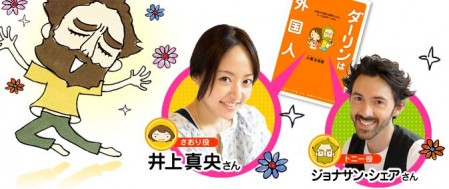My Darling is a Foreigner Movie Announced

An official website has launched for the currently filming live action feature film adaptation of Saori Oguri’s autobiographical manga Darling wa Gaikokujin (My Darling is a Foreigner). The best selling manga chronicles Oguri’s married life with American journalist Tony Laszlo and the cultural differences they encounter and overcome. Live action Hana Yori Dango star Mao Inoue will co-star with actor Jonathan Sherr in the film, which is scheduled to open next spring.
I don’t wish to criticize the original manga nor the people it’s based on, but doesn’t this provide another example of Japan’s isolationist tendency to perceive the world consisting of Japan and “strange foreigners”? I just can’t envision an average American’s story about being married to a foreigner becoming a best selling series that gets adapted into a feature film. In America, cross-cultural marriage is common enough to ordinary.
Source: Japan Today & Tokyograph
Add a Comment
You must be logged in to post a comment.


“but doesn’t this provide another example of Japan’s isolationist tendency to perceive the world consisting of Japan and “strange foreignersâ€?”
To be fair, though, how many “white guy in Asian countries” does Hollywood like to crank out nowadays? Christ, on the KFCC forums I actually worded my topics with “White guy in [insert blank]” whenever a new project got greenlit.
“I just can’t envision an average American’s story about being married to a foreigner becoming a best selling series that gets adapted into a feature film.”
I’m guessing the real appeal is that the guy’s so homely that you wonder why she didn’t hook up with one of those Aryan/biracial bishonen in shojo manga/anime. ^_-
“In America, cross-cultural marriage is common enough to ordinary.”
Tell that to the birthers. =p
An American movie about a cross culture marriage would probably do well actually. Westerners love to observe other cultures; our interest in anime is a testament to this fact. Some examples of successful western films with similar themes would be “My Big Fat Greek Wedding†or “Lost in translationâ€.
As one who read the Manga and is a big fan, I don’t see anything wrong with the content or the movie. I think John, you are missing some really important “cultural” movies that are more ridiculous and less genuine than this one.
For example, Rush Hour. Funny movies, “haha” and all, but the whole series is about a Chinese guy and an American with cultural differences dealing with issues in different ways, even if for the same cause. Hell, the same idea is in movies like 48 hours, Beverly Hills Cops despite being domestic characters. It contrasts the rough Black culture Eddy Murphys character is from and the inescapably white yuppy Hollywood.
Secondly, the manga does not portray how WHACKY Gaijins are. It just reflects how interesting misunderstanding and goofy moments can occur in simple every day life when you have different ‘parameters’ on determining certain ideas.
The mangas portrayed everyone as people and the flow of new ideas as interesting, and promotes the ‘positive struggle (or exciting challenge)’ of everyday life in learning a new language, culture, or cuisine.
To me this is a lot more admirable than say, the-virtually-one-sided assimilation that American culture promotes when immigrants arrive. Eventually the US will have all ethnic resteraunts of all kinds without any mainstream real cultural admiration for other cultures.
To this day Japan is slowly, but surely merging people into its own culture. It is still 1% foreigner out of the 120 million but its a completely different country from 200 years ago (heck, even 30 years ago)
It is true that the demographic has not been shifted drastically, but drastically in its own right. It is not like the US where people just move places because its convenient. The influx of new people, like gaijin, is slow, but fascinating.
A book that cherishes the positives of gaijins like this to me is a welcoming sign of change in perception, not strangeness.